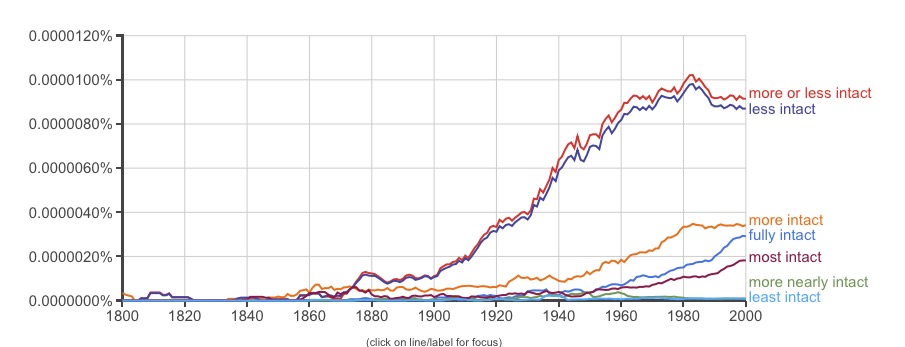Is is redundant to say that something is "fully intact"? To me, it appears that it is, but I have found it in some reputable sources, such as newspapers.
2 Answers
Yes, but adding a redundant modifier to 'intact' seems to be very common. The OED lists all of these examples:
The character of the original house is very much intact. ~ The collection should be kept completely intact. ~ The mill machinery is still intact. ~ The team returns largely intact to defend its title. ~ We found the tomb perfectly intact. ~ a group of old army buildings that had been left largely intact ~ a hero who always escaped by the skin of his teeth, emerging miraculously intact after each cliff-hanging episode -- Oxford Advanced Learner's Dictionary 9th edition © Oxford University Press, 2015
-
I think it's because "intact" is a bit vague. For example, if someone takes a teaspoon from the collection, is it now no longer "intact"? Technically perhaps, but it seems "more intact" than if someone stole a whole bag's worth of stuff. Similarly, if someone breaks the head off a statue, but doesn't steal anything from the tomb, it's still "mostly intact". Commented Jan 25, 2018 at 16:35
-
Please identify dictionaries correctly. OED, ODO and OALD are all different. Commented Jan 25, 2018 at 17:12
A quick look at a dictionary would suggest you are right, as intact is defined as:
untouched or unimpaired; left complete or perfect
One blemish or imperfection, and the object is no longer intact. Thus fully intact would be a tautology.
If this is the case, then intact numbers among a relatively small list of adjectives that cannot logically be quantified: something is perfect or it isn't; something is round or it isn't. These are called absolute adjectives.
The problem is that in the world of everyday speech, English speakers absolutely despise absolutes and insist on comparing the incomparable. Unique, for instance, still means:
existing as the only one or as the sole example; single; solitary in type or characteristics: a unique copy of an ancient manuscript.
One more manuscript and neither is unique. But people have been using the word to mean 'atypical, unusual' for so long, most dictionaries have been forced to include this meaning: one thing can be more unique than another.
A Google NGram for comparisons of intact shows the "proper" way of comparing intact — more nearly intact — hugging the bottom near zero.
Sampling the results shows that intact is used to describe everything from the relative wholeness/health of a human organ to the relative intact state of historic preservation, all of which may be compared.
-
So now, unique means 'not typical; unusual: She has a very unique smile' as well. We have to accept the dictionaries' views on usage rather than our preferences. Commented Jan 25, 2018 at 17:16

